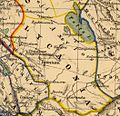Lycaonian is an unclassified extinct language spoken in the former region of Lycaonia. The Lycaonians appear to have retained a distinct nationality in...
2 KB (160 words) - 02:46, 27 March 2025
Lystra (category Articles containing Ancient Greek (to 1453)-language text)
and his companion Barnabas for Zeus. The crowd spoke in the local Lycaonian language and wanted to offer sacrifices to them, but Paul and Barnabas tore...
9 KB (1,037 words) - 07:33, 29 October 2024
Kwisi † (Angola) Ancient Cappadocian † (Asia Minor) – possibly Anatolian Lycaonian † (Asia Minor) – possibly Anatolian Zapotec (Jalisco) † (Mexico) Otomi...
13 KB (1,400 words) - 18:01, 27 March 2025
Isaurian Ουαξαμοας Ouaxamoas < *Waksa-muwa "power of blessing(?)", and Lycaonian Πιγραμος Pigramos "resplendent, mighty" (cf. Carian 𐊷𐊹𐊼𐊥𐊪𐊸 Pikrmś...
45 KB (4,935 words) - 22:06, 13 June 2025
extinct language may be narrowly defined as a language with no native speakers and no descendant languages. Under this definition, a language becomes...
203 KB (7,613 words) - 13:51, 24 June 2025
Luwian Cuneiform Luwian Hieroglyphic Luwian Cilician Cataonian Isaurian Lycaonian Carian Lycian Milyan ("Lycian B") Pisidian Sidetic Western Anatolian?...
154 KB (8,390 words) - 10:14, 2 July 2025
extinct languages of Asia, languages which have undergone language death, have no native speakers, and no spoken descendant. There are 224 languages listed...
94 KB (5,131 words) - 12:31, 20 June 2025
Acts 14 (category Articles containing Greek-language text)
people saw what Paul had done, they raised their voices, saying in the Lycaonian language, "The gods have come down to us in the likeness of men!" The Roman...
18 KB (1,376 words) - 05:44, 18 May 2025
Antipater of Derbe (category Articles containing Ancient Greek (to 1453)-language text)
offended with Antipater and therefore held his sons hostage. Amyntas, the Lycaonian chieftain, murdered him and seized his principality. Strabo xii. p. 392 ;...
790 bytes (99 words) - 02:23, 29 October 2024
Carians (category Articles containing Ancient Greek (to 1453)-language text)
ancient inhabitants of Caria in southwest Anatolia, who spoke the Carian language. It is not clear when the Carians enter into history. The definition is...
23 KB (3,025 words) - 02:28, 13 December 2024
Saint Timothy (category Articles containing Ancient Greek (to 1453)-language text)
Acts of Timothy relates died around the year AD 97. Timothy was from the Lycaonian city of Lystra or of Derbe in Asia Minor, born of a Jewish mother who...
19 KB (2,010 words) - 20:38, 18 May 2025
3rd millennium BC. Identified by their use of the now-extinct Anatolian languages, they were one of the oldest collective Indo-European ethno-linguistic...
11 KB (1,102 words) - 20:02, 18 June 2025
Cimmerians (redirect from Cimmerian language)
Lygdamis and the Treran king Kōbos, and in alliance with the Lycians or Lycaonians, attacked Lydia for a second time in 644 BC: this time they defeated the...
171 KB (20,598 words) - 13:12, 6 June 2025
Konya (category CS1 Turkish-language sources (tr))
ISBN 978-0-330-41879-9. Thonemann, Peter (2011-05-04). "Amphilochius of Iconium and Lycaonian Asceticism". Journal of Roman Studies. 101: 185–205. doi:10.1017/s0075435811000037...
47 KB (3,835 words) - 03:38, 29 June 2025
Kases? / Cases? Cataonians? Carians Cilicians Clitae Isaurians Leleges? Lycaonians Lycians Philistines? - notably inhabited Palestine; their inclusion here...
10 KB (887 words) - 10:11, 9 April 2025
History of the Scythians (category Articles containing Ossetian-language text)
Dugdammî and the Treran king Kōbos, and in alliance with the Lycians or Lycaonians, attacked Lydia for a second time in 644 BCE: this time they defeated...
240 KB (30,047 words) - 06:45, 2 July 2025
List of ancient Anatolian peoples (category Articles containing Ancient Greek (to 1453)-language text)
of Cappadocia, primarily on two hills named Cadra and Davara Isaurians Lycaonians Philistines? (they may have been the people called Peleset by the ancient...
24 KB (2,391 words) - 08:29, 2 July 2025
Coropassus (category Articles containing Ancient Greek (to 1453)-language text)
inhabited in Roman times. Strabo says that the boundary between the Lycaonians and the Cappadocians is the tract between Coropassus in Lycaonia and Gareathyra...
2 KB (265 words) - 07:47, 6 February 2025
Bardanes Tourkos (category Articles containing Greek-language text)
year. In December 803 (Treadgold puts it in 804), however, a group of "Lycaonian" soldiers disembarked at Prote and blinded Bardanes. This was a highly...
21 KB (2,521 words) - 01:52, 5 May 2025
Aezeius (category Articles containing Ancient Greek (to 1453)-language text)
Arcadians were called Aezeians during Aezeius’ reign and this changed into Lycaonians when Lycaon came into power. Azaes Dionysius of Halicarnassus, Antiquitates...
3 KB (276 words) - 13:20, 5 June 2025
Treres (category Articles containing Ancient Greek (to 1453)-language text)
Cimmerians under their king Lygdamis, and in alliance with the Lycians or Lycaonians, attacked the kingdom of Lydia: they defeated the Lydians and captured...
28 KB (3,077 words) - 00:30, 27 May 2025
Dalisandus in Pamphylia (category CS1 Turkish-language sources (tr))
city between Isauria and Lycaonia, and a member of the Koinon Lykaonon (Lycaonian League). The city minted its own coins during the reigns of Roman Emperors...
7 KB (699 words) - 07:12, 23 June 2025











